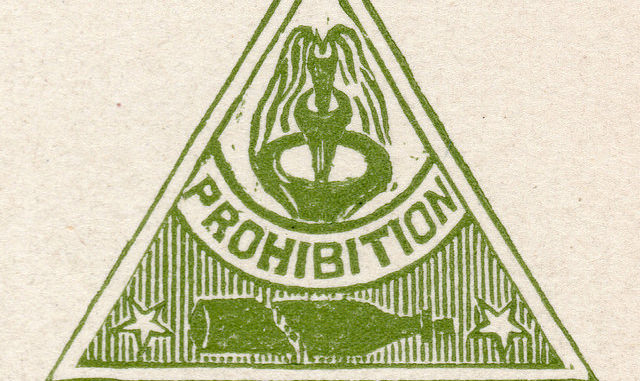
This article originally appeared at MarijuanaPolitics. I also write for those guys.
As Colorado leads the way in the national cannabis legalization effort, the ghosts of national alcohol prohibition–now nearly a century-old–still haunt it. Two proposed ballot initiatives–one announced this week and another that has been picking up steam for months–have stirred these ghosts, but only one aims to exorcise them.
Despite its libertarian, forward-thinking reputation, Colorado has some really weird liquor laws. For starters, it’s one of only five states in America that only allow the sale of low-point beer (3.2% alcohol by volume, or “three-two beer”) at grocery stores and (sometimes) gas stations. Yes, the state that has blessed the nation with Tommy Knockers, Great Divide, and New Belgium doesn’t allow its own grocery stores to carry the full-strength version of these iconic brands. Well, that’s where it gets a little weirder. Because you technically can buy full-strength beer (typically 4-6% alcohol by volume) and wine (13ish% on average) at some grocery stores, but they are few and far between. The state allows retail “chain stores” (think Safeway or Trader Joe’s) exactly one full-service liquor license per brand, and of course those chains put those stores where the money is, i.e. Denver. So maybe not quite so far between. These laws are remnants of 1920s-era prohibition, but have been kept alive by a coalition of special interests that include liquor stores and local breweries which claim (dubiously) that changing the rules would hurt their business as well as the state economy.
A flurry of recent activity, however, is signalling that these antiquated laws may very well finally be on their way out. Your Choice Colorado, a group funded by Safeway, Kroger, and Walmart, has launched an initiative that would end this weird mandatory watered-down beer law the same way marijuana was legalized: by taking it to the voters. Their proposed ballot language would allow for the sale of beer and wine at supermarkets. Concerned that this change would eat into its business, The Distilled Spirits Council of the United States has submitted its own ballot proposals that would extend liquor sales in the state. The loyal opposition, another coalition calling itself Keep Colorado Local and comprised of local breweries, liquor stores, and other local businesses, has also filed its own initiatives in a flagrant attempt to confuse voters come November should it come to that. Add to this cocktail actual pending legislation and it’s as murky as a dirty martini. But the outcome will likely be the end of 3.2 beer in Colorado.
Meanwhile on the cannabis front, two efforts were announced this week that would cap THC potency in recreational/retail marijuana. One is a ballot initiative that would not only impose a cap on THC levels (which right now average about 18% in flower and go as high as the sixties in concentrates), but would also require unsubstantiated scaremongering claims be placed on product labels. The second is a bill proposed by a Republican state legislator that would impose an even lower cap with penalties as high as $100,000 and license revocation for violations. The Cannabist reported on both:
The first THC-capping proposal is a ballot initiative that would limit the potency of cannabis products to 16 percent THC, would require everything to be sold in a child-resistant, opaque, resealable package and would require edibles to be packaged and sold only in single-serving amounts. It would amend the state constitution and would apply only to retail marijuana, not medical…
The initiative would also require all retail marijuana products to contain labels identifying the potency and providing warnings about “identified health risks,” including “birth defects and reduced brain development,” risks to the brain and behavioral development of babies, breathing difficulties, “permanent loss of abilities,” mood swings, impaired thinking and body movement, depression, temporary paranoia, anxiety, and “potential for long-term addiction.”
…
The second THC-limiting proposal is an amendment to HB 1261, a “sunset” bill that reauthorizes rules that are set to expire. Specifically, the bill would extend Colorado’s rules for the sale of retail marijuana until 2019, and would, among other things, eliminate a requirement that licensees post surety bonds and would create new “retail marijuana transport” and “retail marijuana operator” licenses…This amendment would ban recreational cannabis stores from selling “retail marijuana or retail marijuana products” with a THC potency higher than 15 percent. Knowingly violating the ban could result in a punishment as lenient as a license suspension and as strict as license revocation or a fine up to $100,000.
So while a promising effort to undo the ruined remnants of prohibition still influencing Colorado’s liquor laws is growing, a very different force is pushing prohibition-creep in the nation’s most successful regulated marijuana market. The contradiction is astounding and, frankly, unacceptable. In an email to MarijuanaPolitics, Marijuana Policy Project‘s Director of Communications, Mason Tvert, said that the proposed legislation and ballot initiative is not only “odd,” but also potentially unconstitutional:
Even the most potent marijuana is less toxic and poses fewer long-term health problems than alcohol, so it seems odd that these folks are so focused on limiting marijuana potency and seemingly unconcerned about alcohol use. There also appear to be some serious questions about the constitutionality of these proposals. Amendment 64 made possession of marijuana legal for adults under the Colorado Constitution. It would surely be unconstitutional for the legislature to pass a bill banning all marijuana with 1% THC or 5% THC, so why wouldn’t it be just as unconstitutional to arbitrarily ban marijuana that is greater than 16% THC? Allowing adults to consume marijuana flowers with 10% THC and prohibiting them from using marijuana that is 16% THC is like allowing adults to drink Coors Light, but prohibiting them from drinking a Wynkoop Artillery Ale, which has more than twice the alcohol by volume.
The Cannabist‘s reporting indicates that many industry leaders feel the same way. Luckily, both pushes have a long way to go and several obstacles to hurdle. Nearly 100,000 valid signatures are needed for the ballot initiative and the legislation has been laid over with a vote yet to be rescheduled.
Let’s hope both efforts to limit THC content die, their ghosts joining the others in the prohibition graveyard.




Leave a Reply